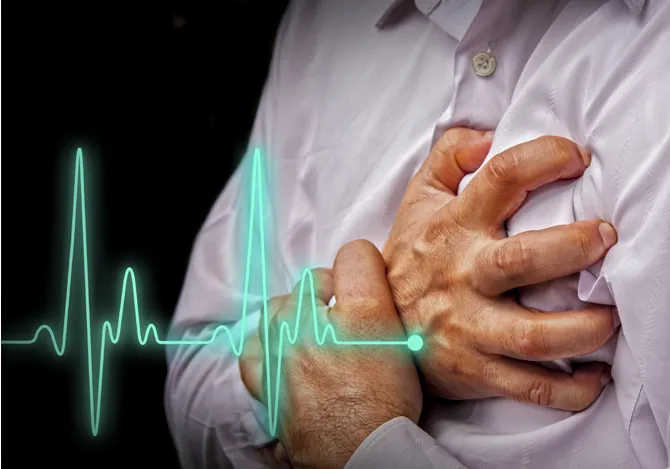-
CENTRES
Progammes & Centres
Location
A recent paper by the Indian Council of Medical Research puts the popular theories linking the COVID-19 vaccination and the rise in sudden deaths among youth to rest.

To determine the cause of sudden deaths among young adults, the Indian Council of Medical Research (ICMR) did a large country-wide study. The paper has just been published in the Research, on 16 November 2023. This explainer about the study is being written as a follow-up to an earlier article that focused on young adult deaths.
Social media frequently discusses such sudden deaths. Each event prompts the recirculation of popular theories, often hinting at a connection to COVID-19 vaccines. The ensuing fear and anxiety drive gullible individuals to promptly share the news, ultimately contributing to the spread of disinformation.
Science involves finding the truth from observations. However, it is not often possible to come to a conclusion based on a single case. For example, a woman might believe that she suffered an abortion because she ate pineapple. The belief gets strengthened when she hears other people share similar observations on social media. Collectively, it evolves into a hoax, which is essentially a widespread false belief accepted unquestioningly and propagated endlessly by a large number of people.
The ensuing fear and anxiety drive gullible individuals to promptly share the news, ultimately contributing to the spread of disinformation.
The ICMR study was one of the largest studies that specifically looked at adults between the age of 18 and 45 who died suddenly. The objective was to see if these people had any risk factors that led to the event, in comparison to other people in the same age group. This is called a case-control study, where the cases are those who died suddenly, and the controls are individuals who did not suffer such an outcome.
Case control studies are an ideal research tool to look at a rare complication of a common exposure, for instance, cigarette smoking and lung cancer. Everyone who smokes will not get lung cancer. In other words, lung cancer is a rare outcome of a common exposure. How to study the connection? The solution is to compare two groups of people, one with lung cancer and another without, looking backwards at their timeline for any difference in previous exposure to various risk factors.
Case control studies are an ideal research tool to look at a rare complication of a common exposure, for instance, cigarette smoking and lung cancer.
Almost a hundred years ago, at a time when the ill effects of tobacco were not known, a few doctors observed that patients who smoked were getting lung cancer. However, their claims were refuted by people with vested interests, saying that it was only a coincidence. Therefore, case control studies were performed, comparing large groups of people with lung cancer with healthy people who did not have lung cancer. To avoid bias, they used controls from the same age group, and researchers compared exposure to multiple factors, including tobacco use. These studies confirmed that people with lung cancer were more commonly exposed to tobacco than those who did not get lung cancer. Thus, the initial theories of denial were dismissed and it was established that cigarette smoking leads to lung cancer.
Likewise, the ICMR study compared the profiles of 729 people who suffered sudden deaths, to four times the number of individuals (2916) who did not suffer such an outcome. The idea was to see if there was anything that the people who died were more exposed to, compared with the others. Specifically, they examined the following possibilities: COVID-19 vaccination, history of COVID-19 hospitalisation, smoking, alcohol and drug use, strenuous exercise and family history of sudden deaths.
The INTERHEART study published in The Lancet in 2007 showed that heart attacks occurred at a younger age among South Asian countries—as a result of multiple coronary risk factors.
The inclusion of some of these parameters was based on observations from previous studies conducted in India and elsewhere. For instance, the INTERHEART study published in The Lancet in 2007 showed that heart attacks occurred at a younger age among South Asian countries—as a result of multiple coronary risk factors. The INTERHEART study also highlighted that alcohol use increased the risk of heart attacks among Indians.
The ICMR study found that there was no correlation between COVID-19 vaccination and sudden deaths. Instead, they found that those who were vaccinated were less likely to suffer sudden death, compared to those who were unvaccinated.
The study found that all the other factors correlated significantly with the outcome of sudden death. This included people discharged after COVID-19 hospitalisation, those engaged in strenuous exercise within the two days prior to death, individuals with a family history of sudden death, and those who used tobacco, alcohol, and drugs.
The study disproves the commonly circulated theory that COVID-19 vaccines are the reason for such deaths.
The study disproves the commonly circulated theory that COVID-19 vaccines are the reason for such deaths. The fact is that sudden deaths among young adults have always been occurring— but they had not received as much attention as they did recently.
When it comes to cardiovascular risk factors, a critical and less-known fact is that they are additive. For example, in a person who is also diabetic, smoking will significantly increase the risk of heart disease compared to a person without diabetes who smokes. The risk will be even higher if, in addition, there is a family history of heart disease at a young age. That is why doctors advise lifestyle measures to reduce heart disease risk. Since the pandemic, COVID-19 has emerged as an additional risk factor, mainly because the virus affects the inner lining of our blood vessels. Several studies have shown an increased risk of cardiovascular events among COVID-19-recovered individuals.
Reports from developed countries have indicated that the overall death rate has remained high ever since the pandemic began. Not all of these deaths are classified as COVID deaths, as many have occurred after recovering from COVID. It is conceivable that the excess deaths are the result of cardiovascular mortality occurring at an increasingly younger age. Another recent study by ICMR showed a high one-year death rate of 6.5 percent among those who were discharged after COVID hospitalisation. Ongoing studies will unearth the exact reasons behind these excess deaths.
The vascular endothelium could be compared to the sensors in driverless self-driving cars, which control the movements of the car.
COVID-19, being a new disease previously unknown to man, is associated with multiple health conditions, including cardiovascular disease and stroke. This is primarily due to the involvement of the delicate inner lining (endothelium) of blood vessels, which in turn control some of the functions of the cardiovascular system. The vascular endothelium could be compared to the sensors in driverless self-driving cars, which control the movements of the car. If a few sensors are damaged, the car could end up in an accident.
Although all sudden deaths cannot be prevented, the study has highlighted specific cardiovascular risk factors. Each one of these risk factors—except family history—is modifiable. For instance, physical activity, abdominal obesity, tobacco and alcohol use can be altered by following a healthy lifestyle. Blood pressure, sugar and LDL Cholesterol can be controlled. Greater attention to these risk factors from an early age is essential for long-term cardiovascular health.
While exercise and an active lifestyle are no doubt essential, the study reminds us that when done excessively when the body has not recovered fully from a setback, it could even be counterproductive. The message is to listen to the body carefully while trying to get back into a routine following a bout of COVID-19. There is no harm in taking one’s own time to resume exercises.
Greater attention to these risk factors from an early age is essential for long-term cardiovascular health.
An important takeaway from the study is that people who have recovered from a severe bout of COVID-19 should not engage in strenuous exercises until cleared by their doctor.
Furthermore, the study emphasises the need to critically assess information, cautioning against blindly accepting social media theories, no matter how convincing or emotionally compelling they may appear. For health-related decisions, relying on evidence-based information remains paramount.
Dr Rajeev Jayadevan is the former president of the Cochin Branch of the Indian Medical Association and the Co Chairman of the National IMA COVID Task Force
The views expressed above belong to the author(s). ORF research and analyses now available on Telegram! Click here to access our curated content — blogs, longforms and interviews.

Dr Rajeev Jayadevan MD DNB MRCP (UK) ABIM (Medicine New York) is a former president of the Cochin Chapter of the Indian Medical Association. He ...
Read More +